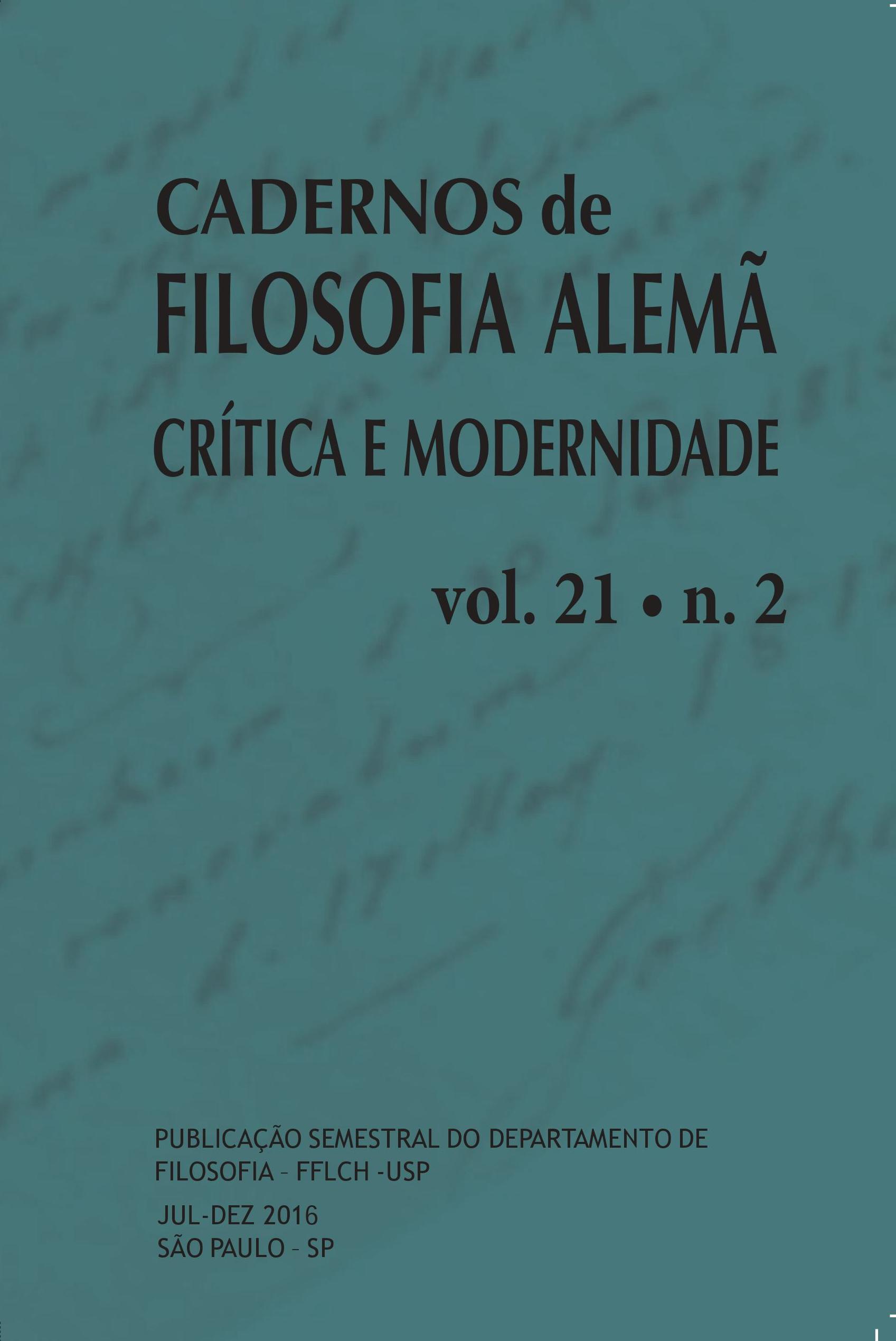Philosophical elements of Fichte’s The Closed Commercial State
DOI:
https://doi.org/10.11606/issn.2318-9800.v21i2p31-47Keywords:
Fichte, State, metaphysics, articulation, reciprocity.Abstract
This paper attempts to expound the philosophical background of the concept of rational State in Fichte’s The Closed Commercial State (1800) and how the Science of Knowledge’s metaphysics ground the political and economical problems found in that work. In order to achieve this, we analyze three points. In the first place, we study the conception of the ideal as the foundation of the real, which is explained through the concept of a projected final goal. In the second place, we compare dogmatism with the articulation between the universal and the particular in Idealism, which leads to a conception of State as a founding unity. In the third and last place, we analyze the commercial, social and horizontal space, where the position of each particular is in a reciprocal relationship with the others.Downloads
References
Fuentes, obras y abreviaturas:
a) Obras completas:
Fichte, J. (1962ss.). Gesamtausgabe der Bayerischen Akademie der Wissenschaften. Hrsg. R. Lauth y otros. Stuttgart: Fromman. (GA, serie/tomo, página).
____________. (1971). Sämmtliche Werke. Hrsg. I. Fichte. Segunda edición. Berlín: W. de Gruyter. (FSW, tomo, página).
b) Obras de Fichte:
____________. Zurückforderung der Denkfreiheit (1793), en FSW VI 1-35.
____________. Beitrag zur Berichtigung der Urteile des Publicums über die französische Revolution (1793), en FSW VI 37-288.
____________. Einige Vorlesungen über Bestimmung des Gelehrten (1794), en GA I/3 23-74.
____________. Grundlage der gesammten Wissenschaftslehre (1794-5), en GA I/2 249-451. (GWL).
____________. Ueber Geist und Buchstab in der Philosophie (1795), en FSW VIII 270-300.
____________. Wissenschaftslehre nova methodo – Halle (1796 ss.), en GA IV/2 17-266. (WLnm-H).
____________. Grundlage des Naturrechts (1796-7), en GA I/3 313-469, I/4 5-165. (GNR).
____________. Erste Einleitung in dieWissenschaftslehre (1798), en GA I/4 183-208. (EE).
____________. Zweite Einleitung in dieWissenschaftslehre (1798), en GA I/4 209-269. (ZE).
____________. Der geschlossene Handelsstaat (1800), en FSW III 387-513.
____________. Die Bestimmung des Menschen (1800), en FSW II 165-319.
____________. Die Grundzüge des gegenwärtigen Zeitalters (1805), en FSW VII 1-256. (GGZ).
Bibliografía secundaria.
Dierksmeier, C. (2011). Der Staat und die Wirtschaft. Fichtes politische Ökonomik. En: G. Zöller (Hrsg.). Der Staat als Mittel zum Zweck. Fichte über Freiheit, Recht und Gesetz. Baden-Baden: Nomos.
Frischmann, B. (2006). Die Herausbildung des Sozialstaatsdenkens im neuzeitlichen Kontraktualismus von Hobbes bis Fichte. Zeitschrift für philosophische Forschung, 60(4), pp.554-589.
Gray, R. (2003). Economic Romanticism: Monetary Nationalism in J. G. Fichte and A. Müller. Eighteenth-Century Studies, 36(4), pp.535-557.
Gross, S. (2008). Handelsstaat versus Globalisierung. Anmerkungen zu J. G. Fichtes «Geschlossnem Handelsstaat». Información Filosófica, 11, pp.201-215.
James, D. (2009). Applying the concept of right: Fichte and Babeuf. History of political thought, XXX(4), pp.647-677.
____________. (2011). Fichte’s Social and Political Philosophy. Cambridge: Cambridge University Press.
Moggach, D. (2009). Freedom and Perfection: The German Debates on the State in the Eighteenth Century. Canadian Journal of Political Science, 42(4), pp.1003-1023.
Nakhimovsky, I. (2011). The Closed Commercial State. New Jersey: Princeton University Press.
Nomer, N. (2005). Fichte and the Idea of Liberal Socialism. The Journal of Political Philosophy, 13(1), pp.53-73.
Schottky, R. (1995). Untersuchungen zur Geschichte der staatsphilosophischen Vertragstheorie im 17. und 18. Jahrhundert (Hobbes, Locke, Rousseau und Fichte). Segunda edición. Ámsterdam / Atlanta: Rodopi.
Siep, L. (1979). Anerkennung als Prinzip der praktischen Philosophie. Freiburg / München: Karl Alber.
____________. (1992). Praktische Philosophie im Deutschen Idealismus. Frankfurt: Suhrkamp.
Verzar, A. (1980). Das autonome Subjekt und der Vernunftstaat. Bonn: Bouvier.
Williams, R. (1992). Recognition. Fichte and Hegel on the Others. New York: State University of New York Press.
Willms, B. (1967). Die totale Freiheit. Köln / Opladen: Westdeutscher Verlag.
Downloads
Published
Issue
Section
License
Information and conceptions on the texts are complete responsibility of the authors.
All the articles submitted before July 5th 2018 and those published after July 2021 are licensed under a CC BY-NC-ND license – except those published between the aforementioned dates, which are under the CC BY-NC-SA license. The permission for the translation of the material published under the license CC BY-NC-ND by third parts can be obtained with the consent of the author.
Open access policies - Diadorim
Rules applied before July 5th 2018:
Presenting a submission to our Editorial Board implies granting priority of publication for “Cadernos de filosofia alemã”, as well as transferring the copyright of texts (once published), which will be reproduced only with the manifest authorization of the editors. Authors keep the right to reuse the texts published in future editions of their work, without paying any fees to "Cadernos”. We will not grant the permission to re-edit or translate the texts for third parts without agreement of the author.


